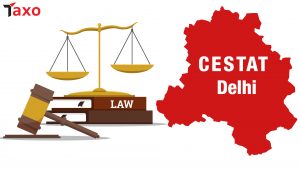 The Hon’ble CESTAT Delhi vide its order dated 13.12.2023 in the matter of M/s International Air Charter Vs. Commissioner of Central Tax (Appeals -II), Delhi in Service Tax Appeal No. – 52064 of 2018, allowed the appeal of the assessee on limitation, finding that mere suppression of facts, as alleged by the department, is not enough and there must be a deliberate and wilful attempt on the part of the assessee to evade payment of duty. In the absence of any intention to evade payment of service tax, which intention should be evident from the materials on record or from the conduct of the assessee, the extended period of limitation cannot be invoked.
The Hon’ble CESTAT Delhi vide its order dated 13.12.2023 in the matter of M/s International Air Charter Vs. Commissioner of Central Tax (Appeals -II), Delhi in Service Tax Appeal No. – 52064 of 2018, allowed the appeal of the assessee on limitation, finding that mere suppression of facts, as alleged by the department, is not enough and there must be a deliberate and wilful attempt on the part of the assessee to evade payment of duty. In the absence of any intention to evade payment of service tax, which intention should be evident from the materials on record or from the conduct of the assessee, the extended period of limitation cannot be invoked.
The Appellant filed the appeal before the Hon’ble CESAT assailing the Order dated 30.01.2018 passed by the Ld. Commissioner (Appeals)
Facts of the Case: –
- The appellant was engaged in providing non-scheduled operation of aircraft for the period up to 30.11.2009 by making the services of aircraft available to various entities for travelling to places in India pre-fixed and pre-intimated on payment of charges, based on duration and destination.
- The appellant believed that the services provided were neither ‘Scheduled Air Transportation of Passengers’ nor ‘Supply of tangible goods for use’ and, therefore, no tax was paid by the Appellant. According to the appellant, the services provided by it would be covered under ‘Air Transportation of Passengers’.
- A show cause notice dated 23.10.2013, invoking extended period of limitation under Section 73(1) of the Finance Act, was issued to the appellant proposing a demand of service tax under the category of ‘Supply of tangible goods.’
- The Appellant duly filed the reply to the said show cause notice denying the allegations made. However, the Adjudicating Authority confirmed the demand after considering the submissions made and held that the extended period limitation was correctly invoked.
- Feeling aggrieved, the appellant filed an appeal before the Commissioner (Appeals) which was dismissed by the impugned order dated 30.01.2018.
Submissions of the Appellant: –
- It was submitted on the behalf the Appellant that that the extended period of limitation could not have been invoked in the facts and circumstances of and, therefore, the impugned order deserves to be dismissed for this reason alone.
- Reliance was placed on the decisions of EIH Ltd. versus Commissioner of Central Excise, Delhi & on Commissioner of Service Tax, New Delhi versus Air Charter Services P. Ltd., to support his contention.
On the other hand, the findings and observations of the impugned order were supported on the behalf of the respondent department
Held: –
- The Hon’ble CESTAT after considering the submissions made and facts of the case found that the sole contention that has been advanced by the learned consultant for the appellant is that the extended period of limitation could not have been invoked. The show cause notice alleges that as the appellant had intentionally and wilfully suppressed facts regarding providing taxable services and did not file the ST-3 returns, it appeared that the appellant had intentionally evaded payment of service tax and the facts would not have come to the notice of the department if the investigation not been conducted.
- It was found that the Appellant filed a detailed reply to the show cause notice and submitted that the appellant was under a bonafide belief that it was not liable to pay service tax since the services provided by the appellant were “air transport of passenger service”. It was also contended that mere suppression of facts is not enough to invoke extended period of limitation, as suppression has to be wilful with an intent to evade.
- However, the Additional Commissioner held that there is no requirement in law that suppression has to with intention to evade payment of service tax and mere suppression is enough for invoking the extended period of limitation.
- Thereafter, the Commissioner (Appeals) merely confirmed the order passed by the Additional Commissioner with even examining the contention raised by the Appellant with respect to extended period of limitation. The finding recorded that suppression of facts is enough to invoke the extended period of limitation under the proviso to section 73 (1) of the Finance Act and there is no necessity of any intent to evade payment of service tax, is against the well settled principles.
- The Hon’ble Bench found that even assuming that there was suppression, it has to be examined whether suppression was wilful and with an intent to evade payment of service tax.
- The Hon’ble Bench took note of the proviso to section 11A of Central Excise Act, 1944, as it stood when the Supreme Court explained “suppression of facts” in Pushpam Pharmaceutical Co. vs. Commissioner of Central Excise, Bombay, and wherein, it was observed by the Hon’ble Supreme Court that since “suppression of facts‟ has been used in the company of strong words such as fraud, collusion, or wilful default, suppression of facts must be deliberate and with an intent to escape payment of duty.
- Thereafter, the Hon’ble Bench took note of the judgment of Anand Nishikawa Company Ltd. Vs. Commissioner of Central Excise, wherein it was held that “suppression of facts” can have only one meaning that the correct information was not disclosed deliberately to evade payment of duty” and also the decisions of Uniworth Textile Limited vs. Commissioner of Central Excise, Raipur; Continental Foundation Joint Venture Holding vs. Commissioner of Central Excise, Chandigarh-I; Bharat Hotels Limited vs. Commissioner of Central Excise (Adjudication) – Delhi High Court; Mahanagar Telephone Nigam Ltd. vs. Union of India and others – Delhi High Court, laying down similar propositions of law.
- The Hon’ble CESTAT found that from the aforesaid decisions, it transpires that mere suppression of facts is not enough and there must be a deliberate and wilful attempt on the part of the assessee to evade payment of duty. In the absence of any intention to evade payment of service tax, which intention should be evident from the materials on record or from the conduct of the assessee, the extended period of limitation cannot be invoked. Thus, mere non-disclosure of the receipts in the service tax return would not mean that there was an intent to evade payment of service tax.
- Lastly, the reference was made by the Hon’ble CESAT to the decision of M/s G.D. Goenka Private Limited vs. The Commissioner of Central Goods and Service Tax, Delhi South, wherein this bench examined the issue at length and held that ‘Suppression of facts has also been held through a series of judicial pronouncements to mean not mere omission but an act of suppression with an intent. In other words, without an intent being established, extended period of limitation cannot be invoked.’
The Hon’ble CESTAT, Delhi with the above observations and findings, allowed the appeal by setting aside the impugned Commissioner (Appeals) dated 31.01.2018.
To read the complete judgment 2023 Taxo.online 1452



